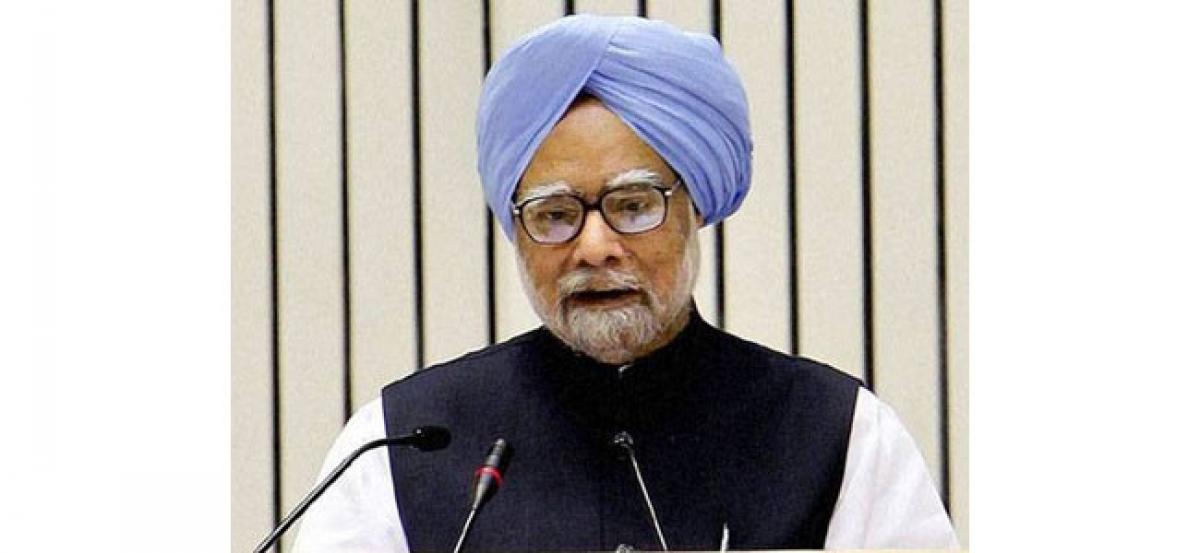Live
- TTD closes Akasaganga, Papavinasam roads
- High costs, limited results: Drone mist-spraying pilot project faces setback
- Poster war on as parties compete for voter attention
- Many dams, tanks filled as rains batter Tirupati dist
- Mayawati, Akhilesh condemn damage to Constitution replica
- Mann slams Centre over ‘one nation, one election’
- Techie suicide case: Mother-in-law flees Jaunpur home
- State government to Supreme Court: New guidelines on how to apply anti-gangster law in UP
- CM Chandrababu to unveil Vision 2047 document today in Vijayawada, traffic restrictions imposed
- State-level LIMES-2k24 inaugurated
Just In

Former Prime Minister Manmohan Singh on Wednesday said atrocities against minorities and Dalits were increasing in the country and such incidents, if unchecked, could harm democracy and called for rejection of \"divisive policies and politics\".
CHANDIGARH: Former Prime Minister Manmohan Singh on Wednesday said atrocities against minorities and Dalits were increasing in the country and such incidents, if unchecked, could harm democracy and called for rejection of "divisive policies and politics".
Delivering the first S B Rangnekar Memorial lecture at the Panjab University, his alma mater, here, Singh also said a "dangerous and false binary" of choosing between freedom and development was surfacing in the country's political discourse and that it must be rejected.
He expressed concern over the alleged attempts being made to divide people."I need not dwell long on the current deep concern that attempts are being made to divide the Indian people on the basis of religion and caste, language and culture. Atrocities against minorities and Dalits are increasing. If unchecked, these tendencies can only harm our democracy.
As a people, we must strongly reject divisive policies and politics," he said.
The former prime minister asserted that freedom of a country did not mean the freedom of just its government. "It is the freedom of people, which, in turn is not the freedom only of its privileged and powerful, but the freedom of every Indian."
"Freedom is, the freedom to question, the freedom to express one's views, howsoever troubling they may be for others. The only constraint to freedom must be the freedom of others. In other words, the freedom of one person or a group should not be used to constrain the freedom of other individuals or groups," he added.
He stressed that without a firm commitment to this idea of freedom, democracy would not survive.Invoking B R Ambedkar, he said there was a need to reassert commitment to maintain India's freedom and Independence.
"We must preserve strategic autonomy in decision-making processes and resist the temptation of rich rewards gained by becoming a tool in the great games of big powers in the pursuit of their imperial ambitions. We need to rebuild our commitment to maintaining India's freedom and Independence, based on individual freedom and independence of every Indian citizen," Singh said.
A dangerous and false binary "that we have to choose between freedom and development" was surfacing in the Indian political discourse, he said, "which must be firmly rejected".
"The argument was put to Mahatma Gandhi, the Father of our Nation, that good governance and development are better than swaraj (self rule)," he said, adding, that the people of the country firmly rejected the idea advanced by colonial forces.
"It (freedom) is, as our founding fathers proclaimed early in our freedom struggle, 'our birth right' on which we shall never compromise. Growth, wealth and development are fruits of democracy, not substitutes," he said.
The noted economist also said it was important to maintain strong focus on contain growing economic inequality.
"While economic growth remains a high priority for the country, there is now a growing concern that the concomitant commitment to ensuring that disparities and inequality do not grow is weakening. This can be a serious potential threat to our democracy.
"What is required is stronger social and political reawakening to the principle of equality - social, economic and political - for the sake of equality and as a mark of our commitment to democracy. In the short term, pro-equality policies may make growth more expensive, but the growing inequality is, in the long term, a far greater danger to economic well being and sustained growth."
Singh was addressing the gathering on the topic: The Seventieth Anniversary of our Independence - Strengthening the roots of our Democracy. Rangnekar was one of the founders of the economics department of the varsity.

© 2024 Hyderabad Media House Limited/The Hans India. All rights reserved. Powered by hocalwire.com







